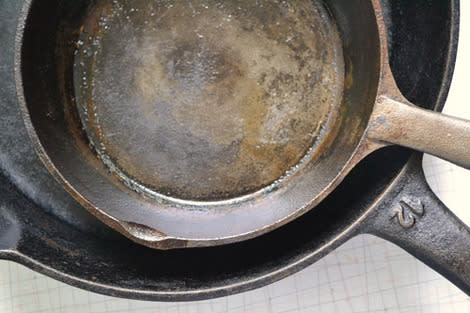Rule with an Iron Pan! How to Care for Your Cast-Iron Cookware
Cast-iron cookware is once again gaining popularity, as people come to appreciate its excellent heat retention and distribution properties, durability, natural nonstick surface and affordable price tag. Cast iron was the norm in home kitchens up until the sixties, when new-fangled non-stick cookware ousted the old-fashioned stuff our grandmothers used. But today we're ditching our Teflon and rediscovering how versatile cast iron can be. It's perfect for everything from baking cakes to roasting chickens, going from oven to stove top in vintage style. Here's how to choose and season a cast-iron pan and how to care for it. If you have the fear of cast iron, we'll help you learn to love it.
Cast iron was made in China in as early as 1600 BC and has since been molded into tools, pots and other instruments. Its excellent heat retention and distribution properties made it ideal for cookware, and its durability meant pots could be used on a daily basis, over an open fire, on a kitchen stove top, or in the oven, and then handed down from generation to generation. Unlike pots and pans made from other materials, cast iron actually improves with age.
Related: The 25 smartest cleaning solutions you've never heard of
When shopping for cast iron, I prefer real, or raw, cast iron, rather than the pre-seasoned kind. You can also find enamel-coated cast iron, like Le Creuset cookware, which also has excellent heat-retention properties and is wonderful for braising, but won't give you the same non-stick surface a well seasoned cast iron pot or pan will. Lodge Cast Iron is currently the only major manufacturer of cast iron cookware in the United States. Lodge products are easy to find in camping and sports stores - visit their website for a store locator. Raw cast iron is sometimes not recognized as cast iron because it's unseasoned and pale grey with a rough surface.
You can also luck out and find well-used (read: well-seasoned) cast iron at garage sales, church sales, and second-hand shops for a few dollars. I bought two of my favorite cast iron pans for $5 15 years ago, and they just get better and better.
It's the seasoning that tends to freak people out. Relax - it's not really a big deal. Seasoning refers to the process in which oil and fat is baked into the pores of cast iron to prevent rusting and to eventually provide a natural, non-stick surface.
Related: 7 unexpected kitchen hazards and how to protect yourself

Seasoning a new cast-iron pan: When you get a brand-new, unseasoned cast iron pan, coat it thickly with lard - animal fat tends to be more effective. Vegetable oils work well too but can get sticky. Put your fat-coated pan in the oven and leave it on the lower shelf while you go about your baking; the combination of fat and heat will create that well seasoned surface. Leave it in for a few hours, and once it starts to turn dark, roast chickens in it, cook bacon - the more you use it, the better it will get until it transforms into that smooth black cast iron we're so familiar with.
Cleaning your cast iron: To clean it, you need only wipe it down with a paper towel or damp cloth. If it needs a better cleaning, I put mine in the sink and wash it with soap and water - you just want to prevent scrubbing it, which can damage the seasoned surface. (If you do this, no biggie - just roast another chicken or coat it with lard and slide it into the oven to get re-seasoned. Cast iron is virtually indestructible; you can always re-season.)
Troubleshooting: If you wind up with rust, Lodge recommends using very fine steel wool or an abrasive soap pad, such as SOS, to scrub the affected area. When the piece is scrubbed down to raw cast iron it should be re-seasoned immediately.
- By Julie van Rosendaal
For 8 ways to spice up your kitchen ... without food, visit Babble!
MORE ON BABBLE
16 natural household cleaners that actually work
Fix it or trash it?! 8 things to know before replacing old stuff
25 totally clever storage tips and tricks on a budget
8 small ways ANYONE can feng shui their home
10 unexpected uses for baking soda

